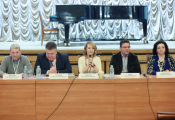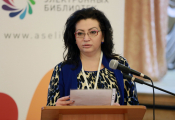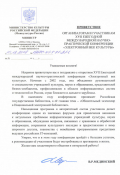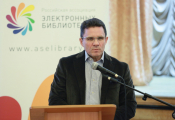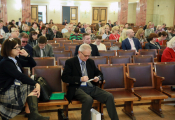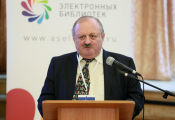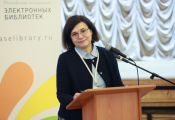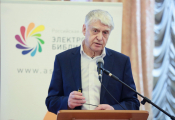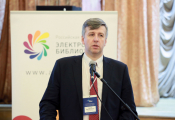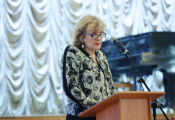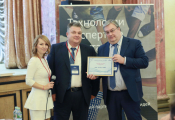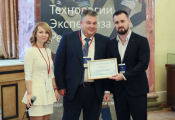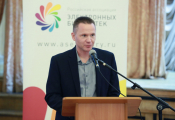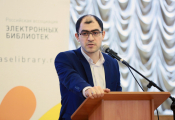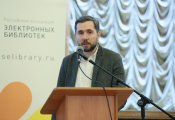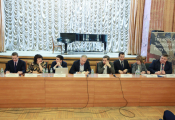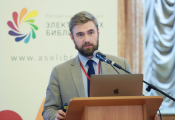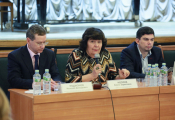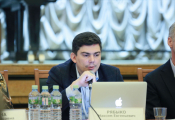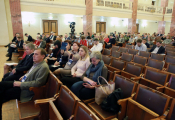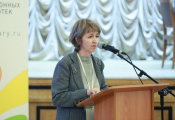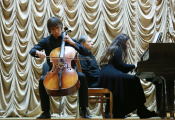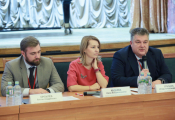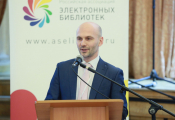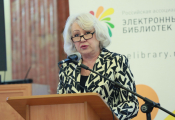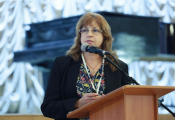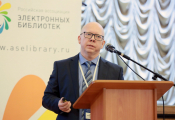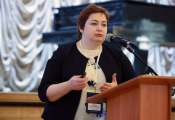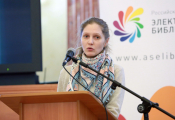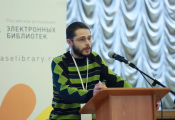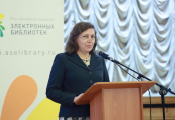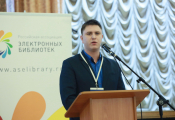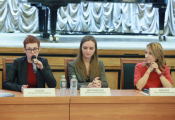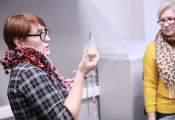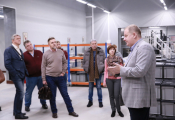Seventeenth Research and Practical Conference "Digital Century of Culture"
29.12.2018
11 – 13 December 2018, the Russian State Library hosted the 17th Research and Practical Conference "Digital Century of Culture" ("DCC"). Traditionally that event of authority for the sphere of culture and information technologies was organized by the Ministry of Culture of the Russian Federation, the Russian State Library (RSL) and the Russian Association of Digital Libraries (NPP "ELBI"). The conference could boast of the following organizations to become its sponsors: LLC "OBERON", LLC "DEMLIZ", LLC "ELBRUS 2000" and Centre of Preservation of Archives and Library Collections.
The participants of the conference discussed a wide circle of themes connected with informatization of establishments of different branches of culture, science and education; with preservation of cultural heritage and providing access to it; with opening prospects for storage, processing, systematization and search of information; with attracting attention to legal aspects of the activities of libraries and information producers. Another point of interest for the guests was presentation of the latest products of leading Russian IT companies and of those ones from abroad. The main theme for "DCC 2018" however was announced to be "Legal Deposit Copy at the National Digital Library (NDL)" .
The Russian Association of Digital Libraries www.aselibrary.ru broadcast directly the meetings of the "DDC 2018" conference on its official website, which gave an opportunity for the specialists from all over the world to participate in the conference via their computers.
The scientific agenda of the "Digital Century of Culture" included a two-day plenary meeting and a series of roundtable discussions with the following issues to be the principal ones: "Legal Deposit Copy at the National Digital Library" and "National Project Culture – Developing Model Libraries". There was also held a field session devoted to collection preservation (visiting the industrial company of mass neutralization of the acidity of documents which was LLC "Bogorodsky Centre of Collection Conservation").
|
Opening the "Digital
Century of Culture 2018"
conference
|
11 December 2018, the conference meeting was opened by Nina V. Avdeeva, head of the Administrative Department of Management and Monitoring Service for Clients of the RSL, IT director of the Russian Association of Digital Libraries, laureate of the A.V. Lunacharsky award. Ms Avdeeva remained the compere of all the events of the conference then.
|
Lidia V. Fediakina speaking
|
|
Greeting speech by
Minister of Culture of
the Russian Federation
Vladimir R. Medinsky
|
Lidia V. Fediakina, head of the Bureau of Libraries of the Department of Information and Digital Development of the Ministry of Culture of the Russian Federation, read out the greeting speech by Minister of Culture of the Russian Federation Vladimir R. Medinsky. Mr Medinsky congratulated everyone on the beginning of the conference and pointed out that the event was bringing together heads and specialists of establishments of culture, science and education, representatives of the business community, as well as professionals of information systems and technologies of Russia and abroad. Vladimir Rostislavovich wished the participants of the "DDC 2018" conference to work fruitfully and with enthusiasm. In her turn, Ms Fediakina was glad to announce that the project of the decree concerning the National Digital Library (NDL) had been approved by all the involved parties without any contradictions, and 7 December 2018 it was brought for consideration to the Government of the Russian Federation.
|
Vadim V. Duda speaking
|
The director general of the RSL Vadim V. Duda would also choose to greet the participants of the conference. Mr Duda emphasized the fact that the success of the NDL Decree was a big step forward. The speaker also pointed out that it was time "to raise the bar" – "We possess all the resources to develop literally unique projects. The projects which could cause a queue of those ones willing to learn to do the same. We are standing on the threshold of an absolutely new era". Vadim Valeriyevich was sure that the matter was not in separate technologies or decisions. The key part was a system comprehensive approach to building mutually advantageous ecosystem of digital knowledge exchange. "The processes taking place at the current moment are of a crucial importance. We are developing the right laws and the right technologies. Moreover, at this very moment there is being laid basis for mutually beneficial relationship between libraries, publishers and other participants of the same market. We have got a common event of the RSL and of the Russian Book Chamber on the agenda. And we consider that fact significant, too. We are partial competitors if the legal deposit copies are concerned, still a really good sign for our users is our attempt to arrange the common set of rules which could be convenient for them. I wish everyone good luck and inspiration, and I would like to remind you once again that now it is time to cooperate and to build up deep and mutually profitable relations".
|
Participants of the conference
|
Several more greeting speeches were addressed to the audience afterwards: by Alexander I. Visly, deputy director general of the RSL, chair of the Council of the Russian Association of Digital Libraries; by Oleg N. Shorin, the director of Library on Natural Sciences of the Russian Academy of Sciences (BEN RAN); by Alexander N. Voropayev, head of the Department of Book Exhibitions and of Encouraging Reading of Federal Agency for Press and Mass Communications (Rospechat); by Maxim Ye. Riabyko, the member of the Committee on Legislation of the Russian Book Union; by Vladimir A. Dvorianov, head of the PR Service of LLC "Inter-Regional Agency of Subscription", assistant member of the Federation Council of the Russian Federation. There were also greetings from our foreign colleagues from the University of Belgrade (Serbia) Alexandra Vranesh, head of the Department of Library Affairs and Computer Science, head of the Centre of Digitalization and of the Centre of Text Studies, Ljiljana Marković, dean of the Faculty of Philology, and Bojana Sabo, senior teacher of Russian, head of the Russian Centre of the Faculty of Philology.
Within the framework of the plenary meeting, 11 December 2018 there were presented the following speeches:
|
Yakov L. Shraiberg speaking
|
"Modern Information Resources of Libraries for Supporting Science and Education" by Yakov L. Shraiberg, president of National Library Association and the director general of the Russian National Public Library for Science and Technology. Mr Shraiberg began his speech with greetings to the participants of the conference. He pointed out that the RNPLS&T would take part in all the "Digital Century of Culture" meetings and wished the event to go on with the same success. As for the informative part of the speech, Yakov Leonidovich emphasized the fact that education could be compared to the mirror of the nation, for its level and quality of arrangement reflected the set of affairs within the nation and foretold the prospects of its potential development as the society was concerned. The informational resources being in use with libraries for supporting science and education could be divided into five blocks: national/centralized subscription for electronic editions; Digital Library Systems (DLS); open archives of information, repositories and other resources of open access; the complex of electronic catalogues of libraries, universities, higher education institutions and scientific organizations; electronic resources of publishing organizations. Mr Shraiberg characterized each of the aforementioned types of electronic resources and described their problems. Upon the speaker’s view, it was necessary to supply the educational process and the science research with modern electronic resources, and it was necessary to teach the participants of that processes how to use them. All the further development of the situation had to be entrusted to the students, scientists and teachers themselves. Yakov Leonidovich concluded his speech by the quotation from Nikolai Rubakin’s works, "Never stop your self-education work and never forget that no matter how long you have studied, no matter how much you already know, the process of your education has neither limits nor boarders".
|
Irina A. Andreeva speaking
|
Speech "Parliamentary Electronic Library (PEL) within the System of Library Electronic Resources of the Nation" was presented by Irina A. Andreeva, head of the Administrative Department of Library Collections (Parliamentary Library) of the Apparatus of the State Duma of the Federal Assembly of the Russian Federation. Ms Andreeva reported to the audience the history of the Parliamentary Library, its electronic resources and services, the process of acquisition of legal deposit copies. The speaker pointed out that the library itself together with all its sources and services was in an everlasting process of changing influenced by new informational demands, new mass media and new economic reality. For the moment of speaking, the library was developing actively digital catalogues and full- textual databases, there were used electronic means of information exchange, there was formed the library collection of electronic books, etc. The Parliamentary Library was changing from repository of printed works into the repository of electronic documents and knowledge. The digital resources of the Parliamentary Library were composed of catalogues, the library itself, reference editions, informational products and the Portal of the Parliamentary Library.
In conclusion Ms Andreeva advised to join the efforts of the libraries acquiring legal deposit copies in order to create the shared national digital library collection of the state in full accordance with the responsibility laid to national libraries by the federal legislation to account, preserve and support efficient usage of free legal deposit copies of documents.
|
Boris R. Loginov speaking
|
The director general of the National Informational and Library Centre LIBNET and of the Central Scientific Medical Library of I.M. Sechenov First Moscow State Medical University Boris R. Loginov presented his speech "Electronic Subscription as Technology of Mutual Usage of Library Resources within Informational and Tele-Communicational Environment". The speech was devoted to specialized technology "Electronic Library Subscription" (ELS). Mr Loginov described the main stages of informatization of Russian libraries, gave a prognosis for the development of library network, paused at the ELS technology which provided online access to full – textual documents. The speaker viewed the destination of the ELS concept in solving problems of the online access within the framework of the current legislation of the Russian Federation (clauses 1270, 1275 of the Civil Code). The ELS technologies for accessing any kinds of documents on solid media was legitimate and could act as a certain compromise for right owners and libraries. The only thing impossible and inadmissible for the ELS technology was unauthorized copying and spreading of the accessed works.
|
Yuri V. Chekhovich speaking
|
The topic of imaginary menaces and real benefits of open access to qualification papers was dealt with in the speech by Yuri V. Chekhovich, the executive director of the "Antiplagiat" company. Mr Chekhovich revealed the relations of the "Antiplagiat" and open access. The story of the open access to qualification papers had acually started not long ago. The "Antiplagiat" company joined it in autumn 2017, when there appeared the project of amendments to the education legislation for the society to discuss. There was planned to bind higher education institutions to put their graduates’ qualification works of masters and of specialists in open access for the term of no less than 6 months after their defence. "With the example of numerous other actions of the same kind we can state that it was even not a half measure" – that was Yuri Victorovich’s opinion concerning that project. Further on the speaker described all the steps undertaken in Russia for opening access to qualification works. The start had been given in the year of 2007 when there was issued a decree on candidate’s and doctor’s dissertation theses. The law obliged to put all the author’s abstracts to dissertation theses into open access. In 2013 there was issued the Decree of Awarding Scientific Degrees. It made obligatory to make all the dissertation theses be put into open access for 10-12 months (depending on the scientific degree of the postgraduate) on the address pointed out in the defence announcement since 1 January 2014. The dissertations had to be made accessible some time before the defence procedure so that any competent specialist could get prepared for the coming defence, attend it (the defence procedure was open to public) and give the comments of their own. Thus there appeared a certain mechanism for public control of the quality of dissertations. It was not in active use, still its very existence turned out to be a constructive idea. As for qualification papers for graduates, they were under the legislation concerning final state attestation process in educational programmes of higher education. Since 1 January 2016, higher education institutions would collect qualification papers of their graduates (VKR), put them on the Digital Library Systems of their own and test for plagiarism volumes. No more procedures for that kind of works were arranged. There existed several institutions which place the VKRs of their graduates into open access after the defence, but the number of those establishments was really low. The main purpose of any VKR was to adjust the qualification of its author. Still the society had to obtain certain mechanism to supervise the quality of the qualification granted, and those mechanisms were to be valid not only within 15 minutes of the defence procedure for VKRs or for an hour/half an hour time of dissertation defence. They had to be valid through all the term of the professional activity of the specialist.
|
Elena D. Zhabko speaking
|
Speech "National Electronic Resources and Educational Environment – Cooperation of Presidential Library with Russian Universities" was presented by Elena D. Zhabko, information resources director of the Presidential Library. Ms Zhabko pointed out that the aim of her report was to ground the place and the role of national electronic resources within the information environment, as well as to describe the capabilities which could be used for their development with usage of information sources of educational establishments. The modern national electronic resources were viewed as effective tools for data and knowledge delivery to different categories of users. Thus development of national resources supposed distinguishing their target audiences first and foremost. "We consider the sphere of education to contain the group of users of the priority – i.e. university environment, student audience, teachers and lecturers, professors, scientists, etc. There has been noticed the growth of numbers of younger readers among our users. Libraries of higher education institutions come to play a particular part while turning from traditional libraries into resources centres capable to arrange their informational and educational environment on their own. That can be explained by the fact that the modern educational processes are based on the usage of electronic textbooks and manuals, periodicals, as well as of a wide range of information library systems. The libraries of higher education institutions reveal the tendency of service personalization. Higher education institutions obtain SMART libraries studying the dynamics of users’ informational demands, search information relevant to those demands and provide that information without queries as such. To a certain degree the libraries of that kind borrow functions of reference and bibliographic services – they offer information to users from well- known sources, journal articles, inter – disciplinary data, etc." Then the speaker pointed out that the unique electronic resource which had ever been developed with users’ requirements, and which for the moment of speaking could be called the most efficient one and the one of the greatest demand was the "Digital Dissertation Library of the Russian State Library (DDL RSL)" project, and its success could be explained by the fact that there had been identified target audience. When developing digital libraries even for the sphere of education one had to have a clear idea of which peculiarities those resources had to possess.
Then Elena Dmitriyevna spoke on the electronic collections of the Presidential Library and on the process of digitization of books from the collections of large libraries of Russian higher education institutions. "The structure of scientific university libraries would often contain private collections of numerous well-known scientists who were founding fathers of education in Russia. Such collections are integral parts of our national culture and of spiritual life of the Russian elite of 19-20th centuries. It goes without saying that the task of digitization of the bulk of documents of that type is challenging for us". The Presidential Library participated readily in diverse events and demonstrated methods and forms of work with university libraries. For the moment of speaking the Presidential Library could boast of its several remote reading rooms basing at different universities.
Within the framework of the plenary meeting, Nina V. Avdeeva, head of the Administrative Department of Management and Monitoring Service for Clients of the Russian State Library and IT director of the Russian Association of Digital Libraries, together with Igor A. Gruzdev, IT director of the Russian State Library and the director of the Russian Association of Digital Libraries, awarded the sponsor’s diplomas to the representatives of the following organizations: LLC "ELBRUS 2000", LLC "DEMLIZ", LLC "OBERON" and Centre of Preservation of Archives and Library Collections.
|
Awarding the sponsor’s
diploma to LLC
"ELBRUS 2000"
|
Awarding the sponsor’s diploma
to the Centre of Preservation
of Archives and Library Collections
|
|
Ilya S. Gavrishin speaking
|
To continue the plenary meeting, there was presented speech "Live History of Russian Child Literature at the National Digital Child Library" by Ilya S. Gavrishin, IT director of the Russian National Child Library. Mr Gavrishin pointed out that the National Digital Child Library was a weekly- replenished free collection of digitized materials from the collections of the Russian National Child Library, from the collections of largest libraries of Russia and from private collections. The project of the digital library had been supposed to become a corporate product, for it was impossible to reflect the history of the child literature in Russia basing exclusively on the collections of the Russian National Child Library. Thus among the partners there could be seen not only child libraries, but libraries for the adults as well. The latter would contribute the materials in different national languages by the way. For the moment of speaking the National Digital Child Library could boast of books, newspapers, contemporary literature for children and teenagers, filmstrips and journals. All the materials published on the digital library were recognized which fact provided capabilities for search not only by metadata but by full texts, too. Users were welcome to look through the library materials by several different ways, the most popular of which was virtual book. In order to provide other libraries with the access to the materials of the restricted group there was realized the technology of virtual reading rooms.
|
Elvin S. Teimurov speaking
|
Elvin S. Teimurov, library director of the Kutafin Moscow State Law University, presented his speech "Using NDL by Libraries of Higher Education Institutions – Legal Challenges". The speaker described the two main problems their library had faced when started dealing with the NDL. The first problem was with the terms. What was "an NDL user"? Clause 2.1 of the Access Contract tо NDL defined the NDL participant as providing access to NDL for users through special terminals. Still clause 3.1 of the same contract prohibited libraries to provide access to the NDL for users who were not employees or students of the organization participant the NDL contract. The problem was in the fact of the existing tendency of "opening" libraries of higher education institutions, and that presupposed their collections to become accessible to anyone. Still only 50% of libraries of higher education institutions did really provide that kind of access. Naturally enough, there came the question: if a library provided the access not only to its employees, how to deal with clause 3.1 of the NDL contract? Later on that problem was solved by amending clause 3.1 of the contract through terms-changing. Then, another problem popped up – how to provide access to the NDL collections beyond the library walls? The question remained unasked for the time being.
|
Petr A. Berberov speaking
|
After that Petr A. Berberov, the director of Digital Library System "ZNANIUM.COM" (LLC "Research and Publishing Centre INFRA-M") presented his speech "Realization of Encyclopaedic Systematization of Information in the Digital Library System "Znanium.com" Project, Supporting the Common Russian Electronic Space of Knowledge Concept". Mr Berberov pointed out that the commercial segment of electronic educational resources had long ago started supporting all the projects related to the single point of access and to the common informational education environment. It became clear that the future of education was connected closely with development and usage of specialized databases, and the year of 2011 witnessed the start of the "Digital Library System (DLS)" project which became a certain catalyst of informational processes. The success of the project made its developers think about efficient search tools and about systematization of the documents included into the systems of the DLS. There also emerged a necessity to develop a one – stop system for accessing all the capabilities of the DLS. The "Znanium.com" Digital Library System went further and started work over analysis and structure of information delivery, cooperation with projects of higher education institutions, over document format, over the possibilities of the DLS integration into federal projects, etc. In 2014 there was created DISCOVERY ZNANIUM, the year of 2016 saw the launching of the ZNANIUM encyclopaedia, which were also described in details by Petr Alekseyevich.
|
Participants of roundtable
"Legal Deposit Copy
at the National Digital Library"
|
The plenary meeting being over, roundtable "Legal Deposit Copy at the National Digital Library" started its work. Its compere was Mikhail D. Rodionov, deputy director general of the RSL in National Digital Library matters.
|
Anton A. Yerpuliov speaking
|
Speech "System of Acquisition of Legal Deposit Copies of Printed Documents in the Electronic Form at the Russian State Library" was presented by Anton A. Yerpuliov, head of the Department of Organization and Management of the Collections of the Digital Library of the RSL. For the two-year period the RSL had been managing the function of accepting legal deposit copies of printed works in the electronic form. Nothing had changed since then, except for several slightest amendments for securing convenience of the procedure of transferring legal deposits in their electronic form. Still among the aspects needing particular attention there were the statistics data. Approximately 45 days there had been carried out works in negotiations with publishers in order to make them transfer all the legal deposits to the RSL. 50% of the respondents would demand all the information in the written form, which had to reflect all the details of how and what was to be transferred. 20% were dealing with downloading the materials. However 30% of the respondents claimed they knew nothing about Federal Law № 278-FZ dated by 3 July 2016 "About Amendments to Federal Law № 77-FZ dated by 9 December 1994 'About Legal Deposit Copies'" (currently in force since 1 January 2017) which fact could not help being astounding. For the moment of speaking, 347 thousand requests had been formed for transferring legal deposit copies in the electronic form, and over 70% of them reached the final stage (were accepted by the RSL for permanent storing). There had been formed 5,966 requests for creating personal accounts of document producers, and over 80% of them reached the final stage, too. The total history of the system witnessed 224 thousand periodicals and 14,012 books to be transferred to the RSL. The Digital Library of the RSL acquired all in all 16,488 copies of documents. Apart from that, Mr Yerpuliov informed the audience that within 10 months of the year of 2018, Roskomnadzor (The Federal Service for Supervision of Communications, Information Technology, and Mass Media) had addressed over 1,000 requests to the periodicals’ publishers concerning their work on transferring legal deposit copies in the electronic form, which caused a surge of legal deposit copy transfers directed to the RSL.
|
Elena B. Nogina speaking
|
Speech "Legal Deposit Copy of Printed Works in the Electronic Form. Technology of Accept and Registration at the Russian Book Chamber" was pronounced by Elena B. Nogina, the director of the Russian Book Chamber ("TASS Russian News Agency" branch). The speaker reminded the audience that two organizations had been established to receive legal deposit copies in the electronic form, and the second one (together with the RSL) was the Russian Book Chamber. The Chamber possessed its own technology of accept and registration of legal deposits, and the technologies of the RSL and of the Russian Book Chamber were somewhat similar if the starting point was considered. Then, in course of her speech Ms Nogina gave details on how to register and use personal account of publisher to transmit legal deposits in the electronic form to the Russian Book Chamber. On entering the collections of the Russian Book Chamber, electronic copies of legal deposits were encoded. For bibliographic records there were chosen only two parts, which were the output data and the imprint data. Then the specialist of the Russian Book Chamber checked the arrived file and registered the edition. It acquired the number of electronic registration. After that the bibliographer made bibliographic description or checked the one which had come with the work itself (if the printed edition had come to the organization earlier). Another way of acquisition of legal deposits was the acquisition of editions in a "package" mode. Thus, electronic copies of work could come either at once or by parts of large volumes. Elena Borisovna concluded her speech by explaining differences of aims of the RSL and of Book Chamber in receiving electronic copies of legal deposit copies of printed editions and gave statistics on the Russian Book Chamber itself.
|
Maxim Ye. Riabyko speaking
|
Maxim Ye. Riabyko, the member of the Legislation Committee of the Russian Book Union, was the next speaker with "NDL Project, Position of the Russian Book Union – Risks, Expectations, Realities". Mr Riabyko presented the publishers’ common opinion of the NDL Decree. Publishers would like to have guarantees of the highest level – from Federal Laws. Lack of guarantees narrowed the range of possible ways of cooperation for publishers and made them suspicious when modes of free usage were changed. Talks about abolition of the Russian Book Chamber and about introducing administrative liability for not-presenting legal deposits would contribute to make suspicions even graver. From the one hand, there had to exist a certain format, the Decree, the basic guarantee set. On the other hand, there did not exist any clear vision of what was going next or of how the cooperation had to be arranged. Publishers could bear risks and transmit legal deposits in the electronic form when the plan of the NDL development was established, the model was tested and the expert group was formed. Mr Riabyko concluded his speech by announcing the publishers to be ready to cooperate only on being informed about the strategic aims of the NDL and about its target audiences. Alongside publishers were ready to get acquainted with the NDL and its technological details closer and in the nearest future possible.
|
Participants of the conference
|
The report under theme "Network Model of Realization of the Legal Deposit Law" was presented by Nikolai Ye. Kalionov, chief researcher of the Library on Natural Sciences of the Russian Academy of Sciences (BEN RAN). Mr Kalionov started his speech by reminding the audience that he Library on Natural Sciences of the Russian Academy of Sciences was to receive legal deposit copies, too. A few years before that there had been introduced the expert system of evaluating proposals of the book market. By the request of BEN RAN institutes had provided their expert scientists for the system. Their total number turned out to be approximately 500 people. After that there were acquired databases of the Russian Book Chamber, and through the network informational system there was formed the evaluation criteria for the informational coherence of the proposals. Within the term of 8-10 years the statistics collected turned out to be oppressive: about 25 thousand editions had to enter the BEN RAN collections each year. The positive expert mark was given to less than 5 thousand of them. That meant approximately 20 thousand books were nothing but waste paper. The specialists of BEN RAN saw the solution of the problems in developing a server for book market proposals. Publishers could put on that server front pages of their editions, annotations, etc. so that each organization meant at the Legal Deposit Law could open those pages and select the editions they really needed within a month term. The aforementioned solution would also provide other organizations with opportunities to get acquainted with the proposals of the book market and to request for the books they were interested in and were going to buy later on.
|
Elena V. Bun speaking
|
"Prospective Concept of the System of Legal Deposit Copies" was presented by Elena V. Bun, counsellor of the director of the Russian Book Chamber ("TASS Russian News Agency" branch). The speaker emphasized that from the viewpoint of legal deposit copies it was necessary to evaluate both, the very system of legal deposit copies and all the amendments to library legislation. In April 2018, there had been presented the project of the prospective concept of the system of legal deposit copies, the modernization of which would be composed of several different stages. Apart from that, Ms Bun pointed out that the system of legal deposit copies had not changed at all since the 60-s of the 20th century. For the moment of the speaking providing legal deposit copies for public usage was impossible. The system of legal deposit copies could not become the base for informational support for the citizens, for its destination was to preserve data, to work out bibliographical records, to catalogue all that and to organize full informing for the subjects of the branch.
|
Gala concert at the
open ceremony of the
conference
|
The first day of the conference meetings was concluded by gala concert. 18 musicians participated in the concert, and during the breaks Leila B. Bayakhunova, head specialist of the Department of Forming NDL Collections, and Maria V. Rogachiova, the director general of Moscow Direction Board in the Development of Culture Centres, demonstrated their presentation "Music Score Resources of the NDL and Performers of the 21st Century". Nina V. Avdeeva was the compere of the gala concert, Anton A. Yerpuliov supervised coordination of scenic activities.
|
Leading plenary sessions
|
|
Vladimir M. Liutetsky speaking
|
12 December 2018, the plenary meeting continued the work of the conference. The second day was given a start by Vladimir M. Liutetsky, science director of LLC "Raduga – LIK s Vami", and his speech "Bibliopoisk is two. Results, problems and prospects". The speaker mentioned that the successful implementation of "Bibliopoisk" had been announced during conference "Digital Century of Culture 2016". Thus, "Bibliopoisk" was a single search box, a discovery service combining digital library catalogues and Digital Library Systems, as well as diverse rented electronic resources, that including open sources. The two previous years witnessed "Bibliopoisk" to be implemented into over 20 libraries of different types, from school libraries to federal ones. 160 thousand searches had been realized and over 65 thousand links to document cards had been performed. Mr Liutetsky gave the examples of cataloguing of one and the same book in different libraries. In fact, usage of different cataloguing principles and rules complicated search indexing for any discovery services operating with library catalogues. If one started analyzing foreign experience of cataloguing, there came out the tendency of leading publishers to make detailed annotated bibliographic references. Detailed filling in of bibliographic fields when cataloguing would improve future search quality. The speaker terminated his report by expressing his hope that the RSL or the Russian Association of Digital Libraries could help in solving the problem of different cataloguing rules and approaches.
|
Ekaterina L. Kudrina speaking
|
The speech "Further Professional Education of the Specialists of Library and Information Sphere within the Common Digital Market" by Ekaterina L. Kudrina, head of Centre "Corporate University Leninka" of the RSL drew the attention of the audience to the fact that changes in the world around us made change libraries as well. The essence of the activities of specialists of library and information sphere was changing due to active implementation of information technologies into it. The novelties generated new requirements to the competences of the specialists involved. Ms Kudrina would also describe the concept of the ongoing education and the system of further professional education, as well as the common digital market. Since the year of 2013, the system of further professional education had only supposed advanced training and professional retraining. The third chain had been lost – and that was postgraduate training (for the moment of speaking only higher education institutions could educate postgraduates). Still in the contemporary conditions of the developing digital economics, the system of further professional training could become a main player within the field of cooperation of library and information organizations with the system of higher professional education. Libraries had to request for specialists to relevant institutes of higher education. Besides, Ekaterina Leonidovna announced the process of changing educational standards to be under way.
In May 2015, the European Commission had published their project of 16 steps to put single digital market in motion. "The three starting points for project realization were chosen the three "pillars" of the single digital market – simplifying access to goods and services on the Internet within the European Union for potential customers and business structures, creating environment and favourable conditions for the successful development of digital networks and services, and assistance to maximal raising potential of European digital economics".
Further on the speaker turned her attention to Corporate University "LENINKA", the plan of its development for the years of 2018-2019, as well as to its target aims and destinations.
|
Svetlana A. Vlasova speaking
|
"Peculiarities of the Union Catalogues of Books and Periodicals of the Centralized Library System of the Library on Natural Sciences of the Russian Academy of Sciences" was the theme of the speech by Svetlana A. Vlasova, head researcher of the Library on Natural Sciences of the Russian Academy of Sciences (BEN RAN). Ms Vlasova pointed out that BEN RAN was supervising the largest centralized library system within the nation. While one of the tasks of the library itself was to develop and support union catalogues of journals, books and periodicals. The catalogue contained data on library acquisitions of national literature since the year of 1993, and of editions from abroad since 1995. The catalogue reflected monographs, collections of articles, materials of conferences, works of organizations and scientific communities, as well as special issues of scientific journals devoted to definite events or personalities. The information on each of the editions included all the data elements implied by the standard for bibliographical descriptions. Besides, they were completed with information on all the authors, editors and compilers of each edition, together with its summary level (for series of volumes and multivolumes). There would also be present indices UDK, translations of headings (for editions in foreign languages), certain additional information which was usually given in extra and reference descriptions common for library practice. Then, since the year of 2012, the editions entering the collections of the Centralized Library System of BEN RAN acquired bibliographic information with scanned copies of their cover and title pages, of their annotations and headings. The access to the catalogue was carried out from the official website of BEN RAN http://cbook.benran.ru. The speaker concluded her report by details on how to work with the digital catalogue of BEN RAN and how search results were being sorted by years or bibliographic descriptions in the direct order, or vice versa.
|
Sergey V. Sokolov speaking
|
The speech to follow was "Legal Deposit Copy in the Electronic Form at the German National Library (Deutsche Nationalbibliothek)" by Sergey V. Sokolov, researcher of the Institute of Scientific Information on Social Sciences (INION) of the Russian Academy of Sciences. Mr Sokolov began his report by mentioning that the development of the system of legal deposit copies in Germany had been tightly connected with actualization of interests of main cultural, political and social factors, which were first and foremost governmental structures interested in supervising printing processes and libraries interested in preservation of single standard copy of edition. Further on, the speaker gave brief history of the phenomenon of legal deposit copy in Germany, he described legal basics of providing legal deposit copies in the electronic form in the contemporary period, that including sanctions for non-providing legal deposits. The point of Sergey Valeriyevich’s particular attention turned out to be digital projects of Deutsche Nationalbibliothek related to legal deposit copies in the electronic form, as well as mechanism of harvesting network data and of searching network resources across the catalogue of Deutsche Nationalbibliothek.
|
Olga B. Ushakova speaking
|
Olga B. Ushakova, deputy head of the Department of FIPS Division "All-Russian Patent and Technical Library" presented her speech "The collection of National Patent Documents in NDL as a Resource of the Community of Knowledge". There were not many people who knew the collection of patent documents to be one of the most significant resources for the community of knowledge. The speaker pointed out that preservation of historical heritage and popularization of intellectual potential of the Russian Federation were impossible without patent documentation. It contained the technical documents which could not be found in other types of editions. The nation provided monopoly of patent usage in exchange for the information about the invention with such details which enabled specialists of the same field copy the invention on the basis of its description only. "Patent documentation is to be used by libraries while providing any kind of informational services", emphasized Ms Ushakova. Further on, Olga Borisovna described the peculiarities of patent documentation and the benefits of its usage. She also spoke on the collections of the All-Russian Patent and Technical Library of Federal Institute of Industrial Property (FIPS), on the FIPS official website and on the capabilities of access to patent documents. In the year of 2017, the National Digital Library had accepted all the national patent documents, and the total volume of the patent documentation made 52% of all the documents of the NDL. In order to organize full search across the patent documentation there had to take place certain updating procedures for the NDL search interface. FIPS was ready to create new or complement the already-existing thematic selections with patent documents, as well as to help to improve functionality of the personal account of NDL resource contributor.
|
Ekaterina V. Tkachiova
speaking
|
Speech "Citation Index on "Web of Science" of a Scientific Journal not Indexed by "Web of Science" (by the Example of the "Bulletin of the Central Botanical Garden" Journal)" was presented by Еkaterina V. Tkachiova, senior researcher of BEN RAN. The statistics on quoting journal "Bulletin of the Central Botanical Garden (GBS Bulletin)" on the "Web of Science Core Collection" was under analysis. The "GBS Bulletin" had been issued since the year of 1948. It was founded by an outstanding soviet scientist Nikolai V. Tsytsin. For the moment of speaking the "GBS Bulletin" could offer its readers materials on the plant introductions, on floristics and systematics, on bio-morphology, physiology, bio – chemistry, genetics and plant selection, etc. 204 issues had been published containing over 4,500 articles by the scientists from research establishments of Russia and from abroad. The very "GBS Bulletin" was not indexed in the "Web of Science" ("WoS") database, however "WoS" was the only database for quotations processing across the sources of the bibliographical lists of its indexed articles. Such information gave a chance to evaluate the quotation rate of not only one separate paper, but of a whole edition beyond the list of sources indexed in the "WoS" database.
When analyzing the "WoS" contents, there were met 45 abridged variants of the title of journal "Bulletin of the Central Botanic Garden". If the statistics relevant to October 2018 was considered, approximately 300 "GBS Bulletin" publications were alluded by the 460 publications from the "WoS" database. From the 154 research works of the Russian authors quoting the "GBS Bulletin" publications, 54 works belonged to the scientists working for the "GBS Bulletin" journal (written within the period of 1975 – 2018).
On the basis of the data analyzed, the speaker made a conclusion that the "GBS Bulletin" journal was popular among national scientists and those ones from abroad in spite of the fact that it was not indexed in the international database of "Web of Science". References to the articles published in the "GBS Bulletin" were also to the latest issues of scientific journals of authority which proved the scientific value of the edition analyzed.
|
Alexander A. Ivanovsky
speaking
|
Alexander A. Ivanovsky, senior researcher of BEN RAN, was the next speaker with "Continuing Considerations of the Problem of Accessibility of National Bibliography in Scientific Periodicals for Final Users". For several previous years, BEN RAN had been developing the System of Selected Information Spreading on different public platforms. Among the subscribers of the system there could be found readers of the BEN RAN itself, together with laboratories, temporal search teams, etc. Users were offered two types of services. The first one was mailing literature concerning new acquisitions on thematic queries formulated by reader themselves. The second type of service was mailing information about new acquisitions in latest journal issues in all the list reported by user. Users were notified by html files transferred for them to their email addresses. Each of the files would contain description of articles by the journal list. In addition to standard bibliographic descriptions, there would be present authentic annotations for each article, link to the web page with the full text of the article (through DOI), link to journal home page and information concerning accessibility of the article on the basis on the data of library subscription. Users were also welcome to mail to the library for obtaining full texts of this or that article they were interested in as that library reader. Mr Ivanovsky also reported on the technologies applied with the System of Selected Information Spreading for providing the information of quality on the national scientific periodicals for readers. He concluded his speech by pointing out that no other aggregator or large publisher of national scientific periodicals offered their users convenient tools for work with bibliography, and neither did they support any of the tools already existing.
|
Olga V. Grebennikova
speaking
|
The speaker to follow was Olga V. Grebennikova with "Preserving Unique Book Heritage in Conditions of Libraries of Higher Education Institutions". The head bibliographer of the Department of Digital Resources and Technologies of the L.I. Abalkin Research and Information Library Centre of the Plekhanov Russian University of Economics spoke on certain stages of development of the university. She also described its library collections, she outlined problems of preservation of book heritage. Ms Grebennikova would also acquaint the audience with the digital collections and digital library of the Research and Information Library Centre. In conclusion the speaker emphasized the fact that libraries in Russia were guided by motto "The future of the mankind is in the librarian’s hands".
|
Ivan A. Krysin speaking
|
The "Model of Terminal of Audio Book Delivery for Readers with Sensory Deprivation" was presented by Ivan A. Krysin, software engineer of the N. Ostrovsky Regional Specialized Library for the Visually Impaired. The speaker pointed out that more and more visually impaired people were getting interested in information technologies such as Internet resources, websites, software, personal computers and smartphones. The Russian segment of the Internet (if the Yandex search catalogue was considered) there could be found 67 adapted Internet resources which were mostly libraries for the blind. However users would reveal interest in multimedia resources as well, such as in Mikhailov’s Library "LOGOS" which could boast of 38 thousand audiobooks. In order to broaden the range of the resources of that kind, IT specialists undertook the attempt to adapt the catalogue of the library for the visually impaired. They used the following technologies: speech recognition and speech synthesis (they functioned in cloud access of Yandex and of Google, too). The version for the blind implied support of programmes of screen access JAWS (programmes speaking out the links of the website or the tabs they were focusing on for such users). There was also in use the technology of template adaptation (scaling the text) which was specially destined for the visually impaired. There was the capability of linking to the Braille display which was the only means of getting information for the blind and deaf users. As a rule, such technologies were implemented at the websites of different libraries. However the N. Ostrovsky Regional Specialized Library for the Visually Impaired went further. There were realized cloud technologies of speech synthesis which realize the function of communicating to users on how to work with the catalogue of the library, of speaking out the terms of the preliminary instruction, of announcing intermedia search results, etc. Making digitized texts available for the visually impaired was possible by way of their transferring to the cloud of speech synthesis the result of which action would be the audio script of those texts. The technology of speech recognition enabled use the Internet resources without keyboard. For the time of the speaking that capability was used actively in Yandex and Google. The aforementioned technology had been tested together with readers and all that resulted in project "Tiflo – catalogue". There was taken the "IRBIS" database and it was converted into the catalogue accessible for the visually impaired, with the organization of the access through the network of the Internet. Mr Krysin demonstrated the prototype of the system and described the integration of the tiflo – catalogue with the database of audiobooks. The next problem the software developers had to face was user authorization, for not all the users could input their email address. There popped up need for an adaptive terminal through which visually impaired users could access the audio collections of the library together with better conditions for their socialization in prospects.
|
Comperes of roundtable
"National Project "Culture" –
Developing Model Libraries"
|
Alongside the plenary meeting, 12 December 2018 there was held roundtable discussion "National Project "Culture" – Developing Model Libraries". The event was conducted by Yevgenia N. Guseva, the director of the Department of National and Priority Projects of the RSL, Anastasia Yu. Diatlovskaya, the director in inter – regional cooperation of the Library of Foreign Literature, and Nina V. Avdeeva, head of the Administrative Department of Management and Monitoring Service for Clients of the RSL, IT director of the Russian Association of Digital Libraries, laureate of the A.V. Lunacharsky award.
Yevgenia N. Guseva reported that every day there would take place changes in national project "Culture" as developing model libraries process was concerned. For the moment of speaking there were going on the preparations for the certain legal documents to be issued. "We consider this project innovative. Our branch will be able to create models and present new constructive activities in a new way". There was supposed to grant 700 million RUR annually within the framework of the project. The money was provided as state grants. Grants were planned to be given only to those administrative subdivisions of the Russian Federation which possessed municipal libraries. Inter-budgetary transfers were to be granted on the competition basis. Across the regions, there was planned to start project offices which could coordinate all the activities and help the participants to modernize their work in full compliance with the aims and tasks of the project. The Ministry of Culture of the Russian Federation appointed the RSL to be the headquarters of the project. Still the model library development concept did not mean to build up new libraries from the very beginning. Developing a model library process presupposed only reconstruction of the already existing library. Still it was rather a serious complex of actions that including providing access to information resources, stocking, organizing connection to the Internet and securing comfortable library space.
Speech "Developing Model Libraries" was presented by Anastasia Yu. Diatlovskaya after that. The speaker reported on realization of the project in Lysogorsk Central Inter – Settlement Library and demonstrated the photos of the library before and after modernization. The total area of the library became 490.8 sq.m, while the whole space of the library was changed with regard to the demands of disabled citizens. The total number of workplaces raised, and the new equipment was bought. Besides, Ms Diatlovskaya described the requirements for the libraries applying to participate in the model – library project.
The results of roundtable "National Project "Culture" – Developing Model Libraries" were planned to serve a basis for the open webinar on the official website of the Russian Association of Digital Libraries http://aselibrary.ru in January 2019. The comperes invited the participants to mail all their questions to the address of the project model-library@rsl.ru.
The speeches by the participants of the conference were heard with pure interest. The audience asked questions which thereupon generated a live discussion.
|
Excursion to LLC "Bogorodsky
Centre of Collection
Conservation"
|
The final day of the conference meetings remained in the memory of its participants for the field session. On 13 December 2018, there took place the trip devoted to collection preservation, which turned out to be a visit to the currently – working industrial company of mass neutralization of the acidity of documents which was LLC "Bogorodsky Centre of Collection Conservation" www.spasfond.ru (the city of Noginsk of Moscow region).
|
Excursion to LLC "Bogorodsky
Centre of Collection
Conservation"
|
The field session and the visit to the industrial company revealed the topicality of the problem of book ageing. The atmosphere of large megalopolises was filled with destructive chemical impurities of the acid character which accelerated the natural processes of document ageing. There could be viewed the raising volumes of defective editions. The participants of the conference had to admit the menace for the collections of Russian libraries.
You are welcome to access video materials of the conference, its specified agenda and presentations to the speeches of "Digital Century of Culture 2018" on the official website of the Russian Association of Digital Libraries in section "Videos of the events" or by links over here:
The first day (11 December 2018):
The second day (12 December 2018):
The third day (13 December 2018):
The statistics data indicates the degree of interest towards the event among the professionals: 31 speech was pronounced, that including the two speeches of the roundtable, 161 participant was registered as attending the events of the conference personally, 2,271 visit was identified on the official website of the Russian Association of Digital Libraries www.aselibrary.ru.


 Virtual Keyboard
Virtual Keyboard
 по-русски
по-русски

